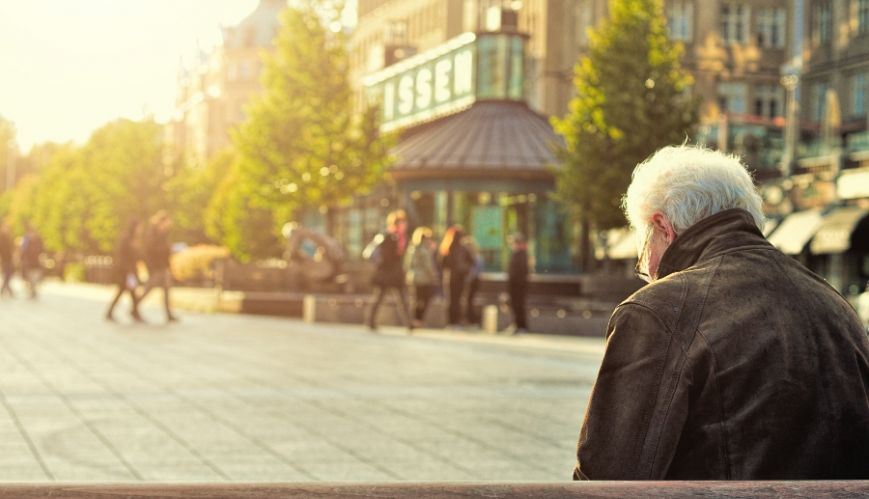The wilderness inside us

The wilderness inside us
24 December 2018
Photo: Huy Phan
By Simone Worthing
Christmas is a time to celebrate the birth of our Saviour, connect with loved ones, and enjoy the gift of giving. It’s the season of joy and peace to the world. But for many, sadly, it can feel the opposite, serving only as an unwanted reminder of a social ill that exists all year round.
Ever wondered where the worst place in the world is? Loneliness.”
This was the updated Facebook status of someone with a caring spouse, healthy children, and friends in the community. Heartbreaking comments like these are not rare.
“I have loving family and friends, but nobody I can talk to about my deepest, innermost feelings, thoughts and fears,” said a busy and active young mother.
In a similar comment, a middle-aged businessman shared, “Nobody really knows me, the real me, and I have nobody to connect with at the soul level.”
Another woman said, “I have nobody to share the sad and scary places of my life with; I have friends, but our relationships are pretty superficial.”
Loneliness.
It has been called twice as deadly as obesity and more dangerous than smoking 15 cigarettes a day*.
According to a 2016 survey by Lifeline Australia, 60 per cent of Australians often feel lonely, and lonelier than they’ve ever felt before. Sixty per cent!
From the 3100 people who responded to the survey, 82.5 per cent felt loneliness was on the rise in society.
A large number of the survey’s online participants lived with a partner or other family member, but still reported feeling isolated.
Graham Long, recently retired pastor and chief executive officer at the Wayside Chapel in inner-city Sydney’s Kings Cross, says loneliness is the epidemic of our times.
This epidemic of loneliness is sweeping the western world. Former United States Surgeon General, Vivek Murthy, says the most common pathology he saw during his years of service “was not heart disease or diabetes; it was loneliness”. 
British Prime Minister Theresa May has set her sights on “combating” loneliness and appointed a minister of loneliness to do just that.
Similarly, there is a national “Campaign to End Loneliness,” to help the nine million lonely people in the United Kingdom.
In this country, the Australian Coalition to End Loneliness, which The Salvation Army has joined, aims to raise awareness of, and address, loneliness and physical social isolation through evidence-based interventions and advocacy.
knowing and being known
Loneliness can take many forms. It can be isolation caused by poverty, mental health issues or addiction; it can be moving to a new location and not knowing anyone; losing a loved one; living alone with few meaningful human interactions; the result of abandonment, abuse, illness or injury; family breakdown; the sadness that comes from not having friends or feeling unable to connect with people; and, as is increasingly common today, being surrounded by people yet suffering the searing loneliness that comes from not connecting on the deep and intimate level that fills the soul emotionally, mentally, spiritually and even physically.
It is not truly knowing anyone, or being truly known.
Jennifer O’Connell, in a 2017 article on loneliness for The Irish Times, described loneliness as, “a sneaky, capricious beast that can overwhelm you at 4am, as the world around you sleeps. It can be transient, a passing state precipitated by unfortunate events, or it can cradle you in its grip for many years ... loneliness is the sadness that comes from lacking friends or company. You can be surrounded by people yet suffer an aching loneliness.”
O’Connell goes on to quote Olivia Laing’s The Lonely City: Adventures in the Art of Being Alone on what it feels like to be lonely: “It feels like being hungry when everyone around you is readying for a feast. It feels shameful and alarming, and over time these feelings radiate outwards, making the lonely person increasingly isolated, increasingly estranged. It advances cold as ice and clear as glass, enclosing and engulfing.” 
In the 17th century, when loneliness was usually relegated to being in the space outside the city, solving it was easy. It merely required a physical return to society. However, as Amelia S. Worsley writes in A History of Loneliness, “... loneliness has since moved inward – and has become much harder to cure. Because it’s taken up residence inside minds, even the minds of people living in bustling cities, it can’t always be solved by company. Modern loneliness isn’t just about being physically removed from other people. Instead, it’s an emotional state of feeling apart from others – without necessarily being so. The wilderness is now inside of us.”
fragmented society
The causes of loneliness are many and complex, and vary from person.
Hugh Mackay, one of Australia’s leading social researchers and commentators, believes that the deep loneliness many of us experience and see all around us, is largely due to the fragmentation of our society.
“You can look at specific factors in individual cases and say, this person is anxious because of rent stress, or because of job insecurity, or because of relationship breakdown, or loss of faith ... but when you’ve got epidemic proportions, I think you have to look at society,” he says in The Conversation’s 2017 Yearbook – Articles from Australia’s top thinkers.
“We need to live in communities that sustain us and nurture us, protect us and give us a sense of identity. When we feel cut off from the herd, anxiety goes up.”
It’s not, as society would have us believe, all about the individual. In his latest book, Australia Reimagined: Towards a more compassionate, less anxious society, Mackay addresses some of the forces at work in our communities – including disappointment in political leadership, loss of faith in once-respected institutions like the Church, dropping education standards, and the explosion of social media – that are causing us to experience, sometimes paradoxically, more loneliness. 
Part of the solution to repairing our fragmented and lonely society, he argues, is to “get off our screens and connect with the people in our local neighbourhoods ... We’re all friendly with our friends and we all know how to be nice to people we like. The great thing about neighbourhoods is they’re full of people we may like or dislike, very different from us. It’s very good for our moral development to have to learn how to rub along with people you didn’t choose.”
Mackay also suggests that faith will play a role in the renewal of our communities towards a more compassionate and less anxious society. “Even among people who don’t have any religious faith, they admire it and often envy it,” he says. “People recognise that the expression of faith, whether in medical care, social services, or education, is likely to be of a very high standard because it’s driven by this faith in the higher being, this higher power.”
And, as Christians we know that this “higher power”, our great and personal God, will never leave us or forsake us (Hebrews 13:5b).
genuine relationships
The Salvation Army’s Matt Cairns, Corps Officer at Rockdale in Sydney, also believes that it’s only through deep and genuine relationships that people can break through the barriers of loneliness.
“This means including the excluded, of course, but also challenging our own cultural practices in terms of who we engage with, and how,” he says. “Developing deep and genuine relationships can be hard, and costly, but learning to engage with people is what faith requires, and is what it means to love thy neighbour.
“This can be uncomfortable at times, especially for us introverts, but we can’t build relationships with the lonely, lost and broken hiding away in our own safety zones. We have to step out in faith. It’s those deep relationships that are built and the genuine friendships that develop, that can help people through loneliness and tough times. Engaging with those suffering loneliness and social exclusion is a calling we must be obedient to.”
Matt shares that it’s human nature to want to avoid certain people, but the challenge is to go and love that person. .jpg&width=300&height=449)
“We see that in Jesus,” he says “He didn’t just engage with his chosen 12 and extended family. He went to the ‘unclean’, the mentally ill, the sick and the excluded. If it’s good enough for Jesus, it’s good enough for us as well. Church should be the ultimate family expression where no one eats alone, no one is left out of celebrations, no one suffers alone, and no one does life alone. In the Kingdom of God, nobody is lonely.”
barriers to authenticity
Lauren Martin, a Salvation Army journalist who runs Red Shield community events, small groups and the Positive Lifestyle Program in the Wollongong suburb of Helensburgh, says that although The Salvation Army comes alongside people who are lonely and isolated due to poverty, mental health issues and disadvantage, the deep loneliness she sees in her community is not related to those struggles.
“This is not a low socio-economic area [Helensburgh], and most people I speak with have lots of friends, yet loneliness and isolation is still a huge issue,” she says. “These community members don’t have a lack of people to hang out with, have coffee with, or speak with on a surface level, but their conversations don’t run deep. They are isolated with the hardships they can’t tell people about, with the pain, shame or fear that they’re dealing with, family issues that they don’t want to share.”
Lauren says that many people talk to her about what is going on in their lives because they know she is from The Salvation Army, can be trusted, and that their sharing will be confidential.
“It’s so sad that, in a lot of cases, people don’t feel like they can share their deepest fears or struggles with friends. Maybe it’s because they feel like they have to live up to their Facebook image,” she shares. “The more we invest in our social media self, the less authentic we are with the people around us, and that creates severe loneliness and isolation.”
Lauren believes the busyness of life is also a huge barrier to developing the deeply connected relationships that encourage open sharing, truly knowing another person and being known by them.
“People don’t have the time to respond when their friends really need them,” she says. “When a crisis happens, the real gift people can give is their time – immediate response, a listening ear, confidentiality and non-judgmental compassion. That’s all I’m offering and it’s received with overwhelming gratitude. To help combat loneliness, people need to know that someone has heard them, is not judging them and stands alongside them with encouragement and care. It’s time, and it’s love – wherever you live. It’s not rocket science yet it’s incredibly powerful.”
* (Duncan Selbie, Chief Executive, Public Health England, 2013)
useful websites
There are many excellent sources of help in a crisis. They include:
Lifeline 13 11 14
lifeline.org.au
Kids Helpline 1800 551 800
kidshelpline.com.au
Headspace
headspace.org.au
Beyondblue 1300 224 636
beyondblue.org.au
MensLine Australia 1300 789 978
mensline.org.au
SANE Australia 1800 187 263
sane.org
neighbourday.org
additional reading
Laing, Olivia, The Lonely City: Adventures in the Art of Being Alone, (Canongate Books Ltd, March 2017)
Mackay, Hugh, Australia Reimagined: Towards a more compassionate, less anxious society, (Pan Macmillan Australia, April 2018).
Park, Simon, Solitude (White Crow Books, 2011)
https://www.jocoxloneliness.org/